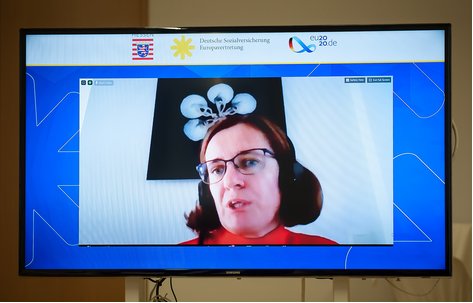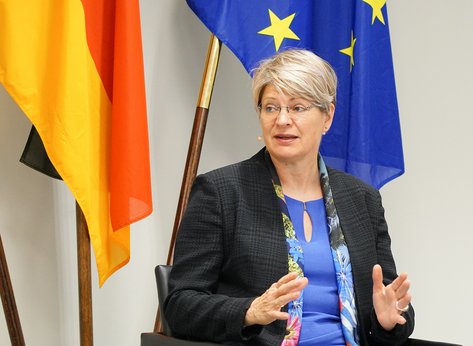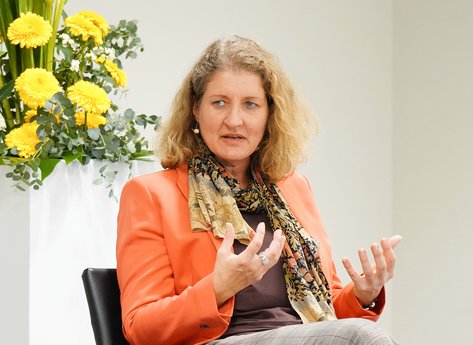 Getty Images/designer491
Getty Images/designer491
Panel 2: The pressure on the self-employed during the pandemic: What does social security for the next generation look like?
ed* Nr. 01/2021 – Chapter 4
In her opening remarks for the second panel, Director Ilka Wölfle addressed the problems of financing social security systems. These are already under pressure due to the changes in the working world. The situation of the self-employed, in particular, has changed in recent years against the backdrop of digitisation, accompanied by new forms of work via electronic platforms. Their operators would have to be held more accountable. “The crisis continues to impact the self-employed particularly hard.” At EU level, platform operators could be supported through cross-border data exchanging and improved international cooperation between the tax and social authorities.
The panel discussion was initiated by Dana-Carmen Bachmann, Head of the Department for Modernising Social Security Systems (Directorate-General for Employment, Social Affairs and Inclusion), on behalf of the EC. Bachmann first followed the discourse of the groups of workers “particularly” affected in the crisis, especially the self-employed, for whom the lack of protection in the event of unemployment, loss of income due to illness and occupational diseases had shown to be particularly severe.
Many member states have helped those affected through “emergency measures”. It would now be necessary to consider whether these instruments could be developed in a “more structured way” in the future.
Access to social protection “for all” will also be part of the Commission’s action plan on the European Pillar of Social Rights.

”Pressure of digitalization changes the world of work.“
Cross-border and pan-sectoral cooperation
The State Secretary at the Federal Ministry for Labour and Social Affairs (BMAS), Björn Böhning, opened the panel discussion with the presentation of the motto #mysocialeurope:
Solidarity and strength for the Europe of tomorrow during the German Council Presidency. The COVID-19 pandemic showed the importance of social security. No one should be left behind, he said - “Social protection should apply to everyone.”
Platform work is so controversial, among other things, because “traditional” tasks performed by workers could be split into a multitude of individual tasks and then performed in forms of work where worker protection would be lost. One would then be dealing with “dependent self-employed”. Under a new guise, old questions of labour and social protection arose: Aren’t self-employed people just as in need of protection as employees? With the diversity of platform work, there will not be “one” approach.
A competition regime for fair platform economies, in the sense of an EU framework, should ensure common rules for platforms. The aim should be to make platforms that neglect social protection of employees accountable. Therefore, the Federal Ministry for Labour and Social Affairs welcomes the legal act on the subject announced by the EC. It would also make sense to establish reporting systems for income from platform work at European level in order to obtain more information about income generated via platforms. At the national level, Böhning gave especial mentioned to the plan to implement compulsory old-age provision for all self-employed persons before the end of this legislative period.

“The triad of economics, democratic foundation and social security makes us resilient in crises.”
Sustainable financing of the systems
The positions of the German Social Insurance were represented on the panel by Gundula Roßbach, President of the German Pension Insurance Fund, and Dr Edlyn Höller, Deputy Director General of the German Social Accident Insurance.
“When is someone an employee or self-employed, when is a platform an employer or an agent?” These are the essential questions in the platform economy.
Roßbach pointed out the importance of compulsory old-age provision for the self-employed. Many solo self-employed persons are exposed to an increased risk of being dependent on basic security benefits in old age. Increasing technologisation and rising employment numbers in the platform economy - with often precarious employment conditions - also promoted this risk.
A study by the International Social Security Association (ISSA) shows that many people are employed in hybrid models: self-employed (platform) work is increasingly being added to the actual job in order to exploit additional earning opportunities or to financially secure the step into new self-employment. As a result, there is a tendency for platform work that replaces the main job, to become full-time at a later date. Therefore, the question “When is someone an employee or self-employed, when is a platform an employer or an agent?” is becoming increasingly relevant with regard to the scope and design of social security.
The distinction between employment and self-employment is a challenge for all status assessment procedures. In this context, it is often a “question of valuation” with regard to the specific form of the employment relationship (work organisation, directive and control functions). Also to be clarified: does the platform only act as an agent (“marketplace function”) or does it fulfil an employer function? Contractual regulations and lived reality often diverged.
Existing data could be used to ensure the complete recording of the contribution obligations of platform employees. For example, sales and employment data could be reported directly by platforms or via financial authorities. However, as national reporting obligations were difficult to enforce in the case of internationally active platforms, it is important to strive for European solutions – such as a uniform digital reporting system (“single digital window”) – or, in the longterm, international solutions.

“When is someone an employee, employer or self-employed? These are the essential questions in the platform economy.”
Dr Höller explicitly sees a shift from dependent to self-employed work. She explicitly promoted a European social security number. This would be an “important building block for identifying the people, who make their activities available on the platform.” The expert confirmed that, also in view of platform work, the legal framework for social security does not need to be reinvented, but readjusted. Every person has the same need for protection against the risk of an occupational accident or disease.

“A European social security number would be an important building block for identifying the people who make their activities available on the platform.”
Europe as a market power vis-à-vis the platforms
Dennis Radtke, a Member of the European Parliament for the German Christian Democratic Union (CDU), made a pointed statement on the topic of market power and platforms. The social expert and coordinator of the EPP Group in the Employment Committee made it clear: “Policymakers should not evaluate whether current developments in the field of platform work are good, but create an appropriate framework.” To adapt to the changed working world, it is not enough to apply the old rules as new ones are needed. They would have to do justice to the heterogeneity of the various forms of platform work. “Not all platform work is the same Deliveroo’s pizza delivery man cannot be equated with an engineer or programmer.“
However, national tasks should not be neglected, such as the expansion of compulsory insurance for the self-employed or the prevention and combating of bogus self-employment.
Finally, the result of a “slido vote” among the participants was presented. It was asked who should bear the costs of extending social security coverage to the self-employed. An overwhelming majority voted that the main financial responsibility should lie with the self-employed people themselvesHowever, at least one fifth saw the state as being responsible – to be funded from general tax revenues.


